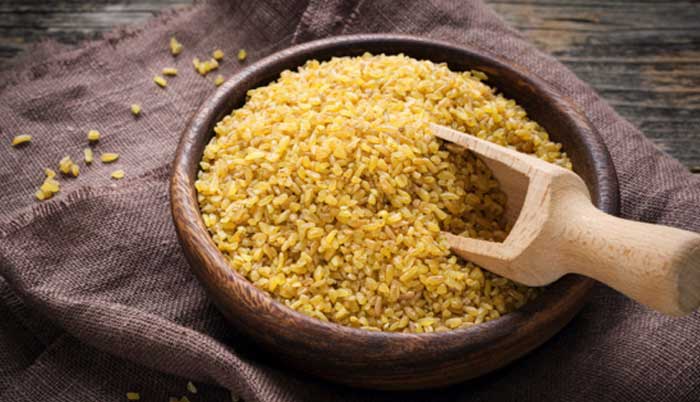![]() Home > Health
Home > Health
Bulgur: An Ancient Grain That Supports A Healthy Heart And Digestion

NEWS TARGET | NATURAL NEWS
![]() May 9th, 2025 | 12:17 PM |
May 9th, 2025 | 12:17 PM | ![]() 250 views
250 views
NATURAL NEWS
Bulgur is high in fiber, plant-based protein and essential minerals like magnesium, iron and manganese. It supports heart health, digestion and blood sugar control.
A 4,000-year-old staple from Mesopotamia, bulgur is valued for its long shelf life, energy density and minimal processing.
Consuming bulgur as part of a healthy diet is linked to reduced risks of colon and breast cancers, diabetes and heart disease due to its high fiber content and low glycemic index.
Bulgar contains gluten. Choosing organic bulgur instead of conventional bulgur mitigates possible pesticide exposure.
Bulgur can be used in traditional dishes (tabbouleh, pilafs), breakfast porridge and modern meals (Buddha bowls, stuffed veggies). It is easy to cook and adaptable.
In the ever-evolving landscape of superfoods, few grains boast the historical legacy and nutritional potency of bulgur. A staple in Middle Eastern and Mediterranean diets for millennia, bulgur is gaining renewed recognition in wellness circles for its impressive health benefits, versatility in cooking and sustainable production.
This ancient whole grain is not just a relic of the past – it is a powerhouse of nutrients that supports heart health, digestion and even weight management.
Brief history of bulgur
Bulgur is a whole wheat grain that has been parboiled, dried and cracked. Unlike processed grains, it retains its bran and germ, making it a nutrient-dense food. Its origins can be traced back to Mesopotamia (modern-day Iraq and Syria) some 4,000 years ago, where it became a dietary cornerstone due to its long shelf life and high energy content. (Related: Here's why you should try bulgur, a whole grain full of protein and dietary fiber.)
Bulgur was widely consumed across the Ottoman Empire and remains integral to dishes like tabbouleh (Lebanon), kisir (Turkey) and pilaf across the Middle East. Though long revered in traditional cuisines, bulgur only gained broader attention in modern health food markets in the 20th century, particularly as interest in whole grains and plant-based diets grew.
Nutritional profile and health benefits
Bulgur is packed with essential nutrients that contribute to overall well-being:
Dietary fiber
A single cup (182 grams, g) of cooked bulgur provides 8.2 g of fiber, about 30 percent of the daily recommended intake. The insoluble fiber in bulgur aids digestion, promotes gut health and helps prevent constipation. Meanwhile, its soluble fiber content can lower cholesterol and helps reduce your risk of heart disease.
Plant-based protein
One cup of bulgur contains 5.6 g of pure plant-based protein, making it a suitable choice for vegans, vegetarians and flexitarians.
Essential minerals
Bulgur contains essential minerals, such as magnesium, which aids muscle, nerve and enzyme function; iron, which transports oxygen and prevents anemia; and manganese, which supports metabolism, bone health and nutrient absorption.
Bulgur also contains calcium, which strengthens bones; zinc, which boosts immunity; and selenium, which acts as an antioxidant.
With a low to medium glycemic index (GI), bulgur can also help regulate blood sugar levels, making it a great food for diabetics and those managing insulin resistance.
Considerations
Bulgur is widely regarded as a nutritious and health-promoting food with very few drawbacks. However, there are two key considerations.
First, since bulgur is made from wheat, it contains gluten, making it unsuitable for people with celiac disease or gluten intolerance. Second, like most whole grains, bulgur contains phytic acid, which can interfere with mineral absorption. Soaking, fermenting or cooking bulgur can reduce phytic acid levels.
Despite these minor concerns, bulgur is far more nutrient-dense and beneficial compared to refined grains like white rice or pasta.
Bulgur isn't typically sprayed with as many pesticides as other crops, but choosing organic bulgur helps reduce your exposure to glyphosate, a controversial herbicide used on conventional wheat, and synthetic fertilizers, which organic farming avoids.
Though wheat can absorb heavy metals like arsenic and cadmium, bulgur is generally safer than rice in this regard. Buying from trusted sources further lowers contamination risks.
Culinary uses of bulgur
Bulgur's mild, nutty flavor and quick cooking time make it a versatile ingredient for both savory and sweet dishes. Here are some delicious ways to include it in meals:
Traditional Middle Eastern and Mediterranean recipes
Tabbouleh: A fresh parsley and bulgur salad with lemon, tomatoes and olive oil.
Kisir: A spicy Turkish bulgur salad with peppers, tomatoes and pomegranate molasses.
Pilafs: Bulgur cooked with broth, herbs and vegetables (e.g., bulgur pilaf with mushrooms).
Breakfast and sweet dishes
Bulgur porridge: Cooked with milk (or plant-based milk), honey and cinnamon.
Energy bars: Mixed with nuts, dried fruits and seeds.
Modern fusion and weight-loss meals
Bulgur buddha bowls: With roasted veggies, hummus and tahini.
Stuffed peppers or eggplants: Bulgur makes a great filling substitute for rice.
This story is not medical advice and is not intended to treat or cure any disease. Always consult with a qualified naturopathic physician for personalized advice about your specific health situation or concern.
Source:
courtesy of NATURALNEWS
by Laura Harris
If you have any stories or news that you would like to share with the global online community, please feel free to share it with us by contacting us directly at [email protected]